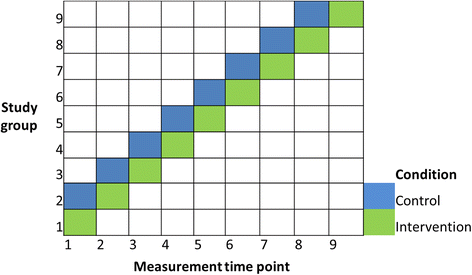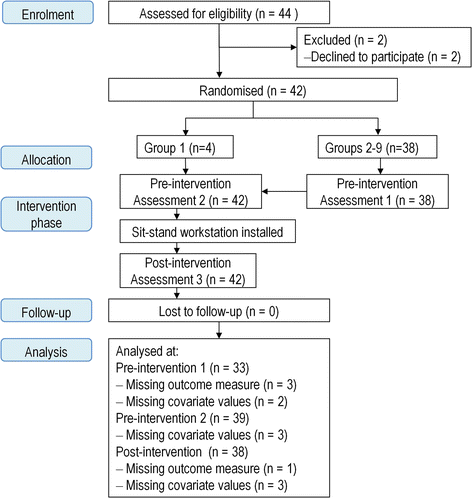The effectiveness of sit-stand workstations for changing office workers' sitting time: results from the Stand@Work randomized controlled trial pilot
- PMID: 25291960
- PMCID: PMC4194364
- DOI: 10.1186/s12966-014-0127-7
The effectiveness of sit-stand workstations for changing office workers' sitting time: results from the Stand@Work randomized controlled trial pilot
Abstract
Background: Prolonged sitting time is detrimental for health. Individuals with desk-based occupations tend to sit a great deal and sit-stand workstations have been identified as a potential strategy to reduce sitting time. Hence, the objective of the current study was to examine the effects of using sit-stand workstations on office workers' sitting time at work and over the whole day.
Methods: We conducted a randomized controlled trial pilot with crossover design and waiting list control in Sydney, Australia from September 2011 to July 2012 (n = 42; 86% female; mean age 38 ± 11 years). Participants used a sit-stand workstation for four weeks in the intervention condition. In the time-matched control condition, participants received nothing and crossed over to the intervention condition after four weeks. The primary outcomes, sitting, standing and walking time at work, were assessed before and after using the workstations with ActivPALs and self-report questionnaires. Secondary outcomes, domain-specific sitting over the whole day, were assessed by self-report. Linear mixed models estimated changes in outcomes adjusting for measurement time, study grouping and covariates.
Results: Intervention participants significantly reduced objectively assessed time spent sitting at work by 73 min/workday (95% CI: -106,-39) and increased standing time at work by 65 min/workday (95% CI: 47, 83); these changes were significant relative to controls (p = 0.004 and p < 0.001, respectively). Total sitting time significantly declined in intervention participants (-80 min/workday; 95% CI: -155, -4).
Conclusions: This study shows that introducing sit-stand workstations in the office can reduce desk-based workers' sitting time at work in the short term. Larger scale studies on more representative samples are needed to determine the public health impact of sit-stand workstations.
Trial registration: ACTRN12612000072819.
Figures
References
-
- Bauman AE, Chau JY, Ding D, Bennie J. Too much sitting and cardio-metabolic risk: an update of epidemiological evidence. Curr Cardiovasc Risk. 2013;ᅟ:ᅟ.
Publication types
MeSH terms
Associated data
LinkOut - more resources
Full Text Sources
Other Literature Sources
Medical



